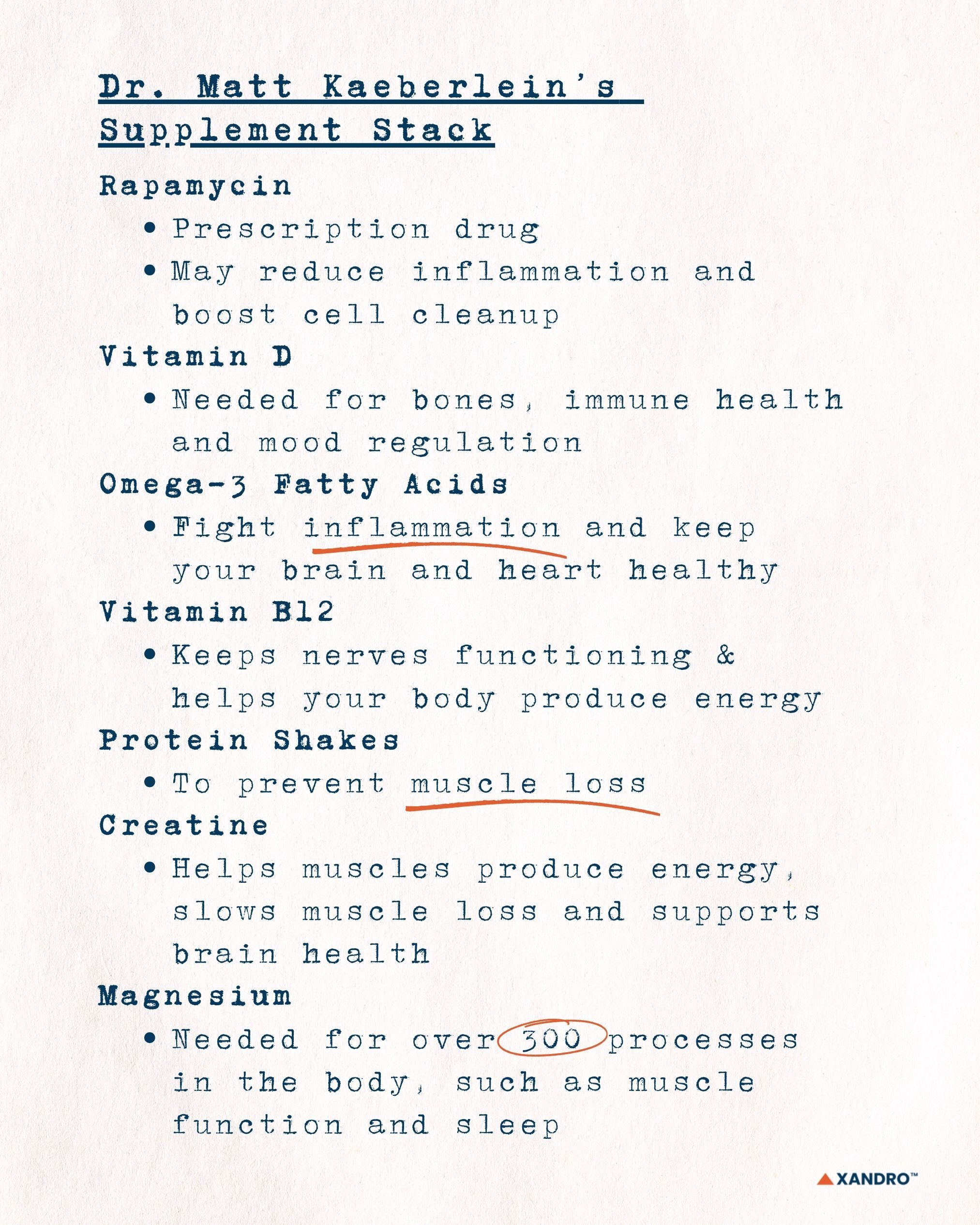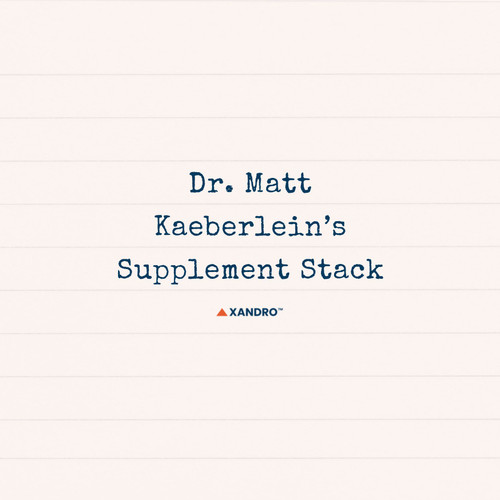Unlock Longevity: Matt Kaeberlein’s Top Supplements (Backed by Science)
13th May 2025
Dr. Matt Kaeberlein’s Supplement Stack: A Science-Backed Approach to Healthy Ageing
Products mentioned in this blog:
Dr. Matt Kaeberlein, a leading ageing researcher and professor at the University of Washington, takes a cautious, evidence-based approach to supplements.
Unlike some longevity experts who experiment with a long list of compounds with mixed scientific research, Kaeberlein focuses on supplements that either address a known deficiency or have strong scientific backing for health benefits.
His philosophy? Test, don’t guess.
Here’s a breakdown of what he takes and why:
The Matt Kaeberlein Supplement Stack
1. Rapamycin (6mg once a week)
Rapamycin isn’t your average supplement, it’s a prescription drug originally used in organ transplant patients. In low doses, research suggests it might slow down ageing by improving cellular cleanup and reducing inflammation.
Kaeberlein takes 6mg once a week for about 12 weeks, then takes a long break. He noticed it helped heal his frozen shoulder, which he believes might be due to its anti-inflammatory effects. But he’s cautious — since it’s a powerful drug, he doesn’t take it continuously.
2. Vitamin D
If you live somewhere cloudy (like Seattle, where Kaeberlein works), chances are you’re low on vitamin D. This nutrient is needed for strong bones, a healthy immune system and even mood regulation.
Kaeberlein takes it because blood tests showed he was deficient, which is a common issue, especially as we age, and our skin becomes less efficient at making vitamin D from sunlight.
Further Reading: Everything You Need to Know About Vitamin D
3. Omega-3 Fatty Acids (1,000–2,000mg fish oil daily)
Found in fatty fish like salmon, omega-3 fatty acids are important for fighting inflammation and keeping your heart and brain in good shape. Kaeberlein takes 1,000–2,000mg of fish oil daily because, like many people, his levels were too low.
Studies suggest omega-3s may help prevent cognitive decline and even reduce the risk of heart disease, so if you’re not eating fish regularly, a supplement might be worth considering.
For brain health, the latest research shows that omega-3 bound with LPC is needed for it to cross the blood-brain barrier and actually keep your brain healthy. LPC Neuro is one such supplement using LPC-bound omega-3, so check it out to learn more.
Further Reading: Is Traditional Omega-3 Useless for the Brain?
4. Vitamin B12
B12 keeps your nerves functioning properly and helps your body produce energy. As we age, however, absorbing it from food becomes harder. Some medications (like acid reflux drugs) can also lower B12 levels.
Kaeberlein supplements with it because, like many people, he likely doesn’t get enough from diet alone, especially if he’s not eating a ton of meat or fortified foods.
The Extras: Protein, Collagen, Creatine and Magnesium
1. Protein Shakes (with Collagen and Prebiotics)
Muscle loss is one of the biggest threats as we get older. To fight back, Kaeberlein drinks protein shakes, often with added collagen (for joint and skin health) and prebiotic fibers like inulin and chia seeds (to feed his gut bacteria).
He doesn’t obsess over exact amounts, this is more about making sure he gets enough high-quality protein to maintain muscle, especially since he strength trains.
Further Reading: The Link Between Protein and Longevity
2. Creatine
Often associated with bodybuilders, creatine is one of the most well-researched supplements out there. It helps muscles produce energy during intense exercise, but it may also support brain health and slow muscle loss with age.
Kaeberlein takes it because he does resistance training, and the science behind it is solid — unlike many supplements, creatine actually has decades of research backing its safety and benefits.
3. Magnesium
Magnesium is involved in over 300 biochemical reactions in the body, from muscle function to sleep regulation. Yet, many people don’t get enough from their diet.
Kaeberlein started taking it after hearing Dr. Peter Attia discuss its benefits. Low magnesium has been linked to high blood pressure, poor sleep and even muscle cramps, so if you’re not eating enough nuts, seeds, or leafy greens, a supplement might help.
Make sure you take a highly absorbable form of magnesium and one that is gentle on your stomach, such as Magnesium Glycinate.
Further Reading: Our Ultimate Guide to the Best Longevity Supplements

Supplements He’s Considering (But Doesn’t Take Yet)
Kaeberlein is open to new research, but he doesn’t jump on every supplement trend. Here are a few he’s keeping an eye on:
- Low-dose Tadalafil (Cialis, 2.5mg/day): Normally used for erectile dysfunction, tiny doses might improve blood flow and heart health. The risks seem low, so he’s considering it.
- Calcium Alpha-Ketoglutarate (Ca-AKG): Early research suggests it could help with bone health and longevity, but human data is still limited.
- Urolithin A: A compound made by gut bacteria that may boost muscle and mitochondrial function. Promising in animals but still being tested in humans.
Matt Kaeberlein Supplements: What He Avoids (And Why)
Unlike other longevity experts (like David Sinclair), Kaeberlein doesn’t take NAD+ precursors like NMN or NR. While they’re popular for supposedly boosting cellular energy, he’s not convinced the benefits outweigh the unknowns.
He also warns against:
- Taking supplements out of fear (without a real need).
- Following influencers blindly (many don’t research risks vs. benefits).
- Stacking too many supplements can cause unexpected side effects.
The Bigger Picture: Supplements Are Just One Piece of the Puzzle
Kaeberlein’s real secret isn’t a pill, it’s his balanced approach to health. He focuses on:
- Strength training (to preserve muscle and bone)
- A good diet (plenty of protein, fiber and healthy fats)
- Sleep and stress management (because no supplement fixes poor lifestyle habits)
- Getting blood tests to check for deficiencies (like vitamin D or omega-3)
He also recommends only supplementing if needed and then tracking your improvements.
End Note
Kaeberlein’s supplement stack is modest, well-researched and tailored to his personal health metrics. His cautious approach reminds us that more supplements do not equal better health; smart, targeted choices do.
For anyone looking to improve their health, his approach is a great blueprint:
- Test first (don’t assume you need something).
- Start with the basics (vitamin D, omega-3s, protein).
- Add only what’s necessary (and track changes).
- Don’t ignore lifestyle (exercise, sleep, and diet matter most).
Check out other longevity expert supplement stacks below:
- Valter Longo Supplement Stack
- David Sinclair Supplement List
- Andrew Huberman Supplement Stack
- Bryan Johnson Supplement Stack
Products mentioned in this blog:
